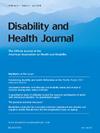热浪频率与残疾状况:美国南部的热不平等。
IF 3.3
2区 医学
Q1 HEALTH CARE SCIENCES & SERVICES
引用次数: 0
摘要
背景:尽管人们发现极端高温在社会弱势群体和边缘化群体中的分布不成比例,但在以往有关高温暴露差异的研究中,对残疾人的关注却很有限:通过分析美国南部--该地区夏季气温极高,残疾发生率较高--当地热浪频率与残疾人比例及特定残疾类型之间的关系,弥补了这一不足:方法:将美国联邦紧急事务管理局国家风险指数中的热浪年化频率的人口普查区级数值与最新的美国社区调查五年估计中的相关残疾变量联系起来。统计分析基于双变量相关性和多变量广义估计方程,这些方程考虑了基于气候区和县的地区空间聚类:结果:非机构化平民中残疾和一种以上残疾的总体比例显著增加(p 结论:非机构化平民中残疾和一种以上残疾的总体比例显著增加(p 结论:非机构化平民中残疾和一种以上残疾的总体比例显著增加(p 结论):美国南部这些与高温有关的分配不公现象表明,迫切需要(1) 将残疾状况纳入未来热浪暴露社会差异的研究中;(2) 在其他地区、州和国家进行更详细的调查;以及 (3) 制定包容残疾的政策和干预措施,在极端天气事件中提供公平的保护。本文章由计算机程序翻译,如有差异,请以英文原文为准。
Heatwave frequency and disability status: Thermal inequities in the U.S. South
Background
Although extreme heat has been found to be disproportionately distributed with respect to socially disadvantaged and marginalized groups, persons with disabilities have received limited attention in previous research on heat exposure disparities.
Objective
This gap is addressed by analyzing the relationship between local heatwave frequency and the percentages of people with a disability and specific disability types in the U.S. South—a region characterized by extremely high summer temperatures and greater disability prevalence.
Methods
Census tract level values of heatwave annualized frequency from the U.S. Federal Emergency Management Agency's National Risk Index are linked to relevant disability variables from the latest American Community Survey five-year estimates. Statistical analyses are based on bivariate correlations and multivariable generalized estimating equations that consider spatial clustering of tracts based on climate zone and county.
Results
The overall percentage of civilian noninstitutionalized persons with a disability and more than one disability are significantly greater (p < 0.001) in census tracts with higher heatwave frequency, after controlling for clustering, race/ethnicity, socioeconomic status, older age, population density, and metropolitan status. Heatwave frequency is also positively and significantly associated (p < 0.01) with the percentages of people with hearing, vision, cognitive, ambulatory, self-care, and independent living difficulties.
Conclusions
These heat-related distributive injustices in the U.S. South demonstrate an urgent need to: (1) include disability status in future research on social disparities in heatwave exposure; (2) conduct more detailed investigations in other regions, states, and nations; and (3) develop disability-inclusive policies and interventions that provide equitable protection during extreme weather events.
求助全文
通过发布文献求助,成功后即可免费获取论文全文。
去求助
来源期刊

Disability and Health Journal
HEALTH CARE SCIENCES & SERVICES-PUBLIC, ENVIRONMENTAL & OCCUPATIONAL HEALTH
CiteScore
7.50
自引率
6.70%
发文量
134
审稿时长
34 days
期刊介绍:
Disability and Health Journal is a scientific, scholarly, and multidisciplinary journal for reporting original contributions that advance knowledge in disability and health. Topics may be related to global health, quality of life, and specific health conditions as they relate to disability. Such contributions include:
• Reports of empirical research on the characteristics of persons with disabilities, environment, health outcomes, and determinants of health
• Reports of empirical research on the Systematic or other evidence-based reviews and tightly conceived theoretical interpretations of research literature
• Reports of empirical research on the Evaluative research on new interventions, technologies, and programs
• Reports of empirical research on the Reports on issues or policies affecting the health and/or quality of life for persons with disabilities, using a scientific base.
 求助内容:
求助内容: 应助结果提醒方式:
应助结果提醒方式:


